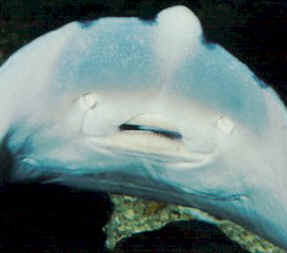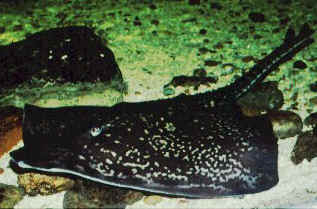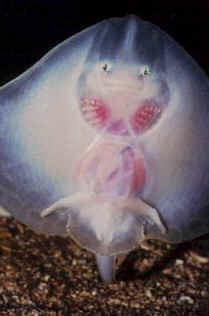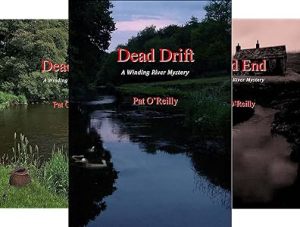Dipturus batis - Common Skate
Phylum: Chordata - Class: Elasmobranchii - Order: Rajiformes - Family: Rajidae

Now a very rare fish (threatened with extinction in most areas other than Toff part of the coast of western Scotland), the Common Skate can weigh up to 250lb (110kg) with an overall length of nearly three metres; a 208lb specimen broke the British rod-caught record in 2014; the fish was returned to freedom after being weighed..
For many years anglers have operated a voluntary ban on taking Common Skate, and commercial fishermen have been urged to return any skate they catch.

These large predators live in deep water - typically 30 to 300m but occasionally as deep as 600 m - and feed on crabs, lobsters, bottom-dwelling fish and even other smaller kinds of rays. They are occasionally caught by anglers fishing from boats.
Male and female skates have prickles on the underside of the body and a row of spines down the tail. They are generally a darker grey-brown than thornback rays, and the underside is blue-grey.
The egg of a skate is what (along with similar shaped eggs of other members of the shark family, including dogfish and tope) we commonly call a 'mermaid's purse', and it is typically 6cm long and 4cm wide with four horns, one at each corner.
The young skate illustrated below has recently hatched from its egg and absorbed the yolk sac, so now it must find its own food. Its five gills can be seen now, but as it grows up only the five gill slits on each side will remain visible. The skate is a slow-growing fish and will take at least ten years to reach sexual maturity.
More information is available at: www.sharktrust.org

Excited at the prospect of flyfishing? So are we, and we're pretty sure you would find the Winding River Mystery trilogy of action-packed thrillers gripping reading too. Dead Drift, Dead Cert, and Dead End are Pat O'Reilly's latest river-and-flyfishing based novels, and now they are available in ebook format. Full details on our website here...
Buy each book for just £4.96 on Amazon...
Please Help Us: If you have found this information interesting and useful, please consider helping to keep First Nature online by making a small donation towards the web hosting and internet costs.
Any donations over and above the essential running costs will help support the conservation work of Plantlife, the Rivers Trust and charitable botanic gardens - as do author royalties and publisher proceeds from books by Pat and Sue.
